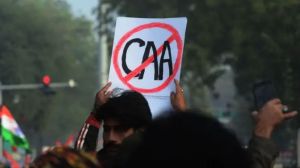From technology transfer in defence to going after the Lashkar-e-Toiba, from cyber security to tackling online child pornography — a new joint statement on defence and security has emerged as a major takeaway from the meetings between Prime Minister Narendra Modi and his British counterpart David Cameron on Thursday and Friday.
The two spent a considerable amount of time talking about terrorism at the Chequers — Cameron’s country residence where Modi spent the night — on Friday morning, sources told The Indian Express. They also discussed several issues while taking a walk at the countryside lawns Friday morning before heading for breakfast.

This is the first time a joint statement of this nature has been signed between the two countries. It explicitly mentions the Lashkar-e-Toiba, Hizb-ul-Mujahideen, the Haqqanis and says the two countries will work together to disrupt “all financial and tactical support for terrorist networks”, including Islamic State and al-Qaeda.
[related-post]
Story continues below this ad
In the 2013 joint statement when Cameron visited India, they had — without naming any particular group — merely agreed that all terrorist networks, wherever they exist, must be defeated.
Indian officials told The Indian Express that this is a significant step forward. According to the joint statement issued late Thursday, India and the UK said that they stand united against terrorism in all its forms and manifestations and support the early finalisation of a Comprehensive Convention on International Terrorism. “They will continue to work together to disrupt all financial and tactical support for terrorist networks including ISIL, al-Qaeda, Lashkar-e-Toiba, Hizb-ul-Mujahideen, the Haqqanis and associated groups. The two countries reiterate their call for Pakistan to bring the perpetrators of the November 2008 terrorist attack in Mumbai to justice,” the joint statement said.
Asked if Dawood Ibrahim’s case is also covered in the counter-terrorism cooperation, Ministry of External Affairs spokesperson Vikas Swarup said, “Specific individuals were not discussed but the idea of this joint statement is to create that umbrella framework under which this kind of a security cooperation can continue.”
On Thursday, responding to a question at the joint press conference, Modi said, “Both our countries face extreme threat from terrorism, that is why fighting terrorism is not something that just one or two or three countries can do. This is the responsibility of every human… Mahatma Gandhi used to say that you only get justice when you know what injustice is. So, who do we designate as terrorists? Who helps the terrorists? In fact, there is a proposal in the United Nations on this issue, but unfortunately, it is just hanging without any settlement and the UK and we agree that we need to discuss this at length. That is why all well-meaning nations should work together.”
Story continues below this ad
Cameron then said, “India has suffered on the streets of Mumbai… We have suffered on the streets of London, and we have to confront, particularly this Islamist extremist violence and terrorism, which is doing so much damage, not just to our countries but also to the world….”
On defence cooperation, the joint statement said that UK and India will “elevate” their defence relationship by establishing capability partnerships in strategic areas, through which they will work together across the spectrum of doctrine, training and other elements upon which military effectiveness depends.
The two PMs also agreed that their governments would work together to support ‘Make in India’ on indigenous defence projects. Cyber security also emerged as a priority during the visit. According to the joint statement, the two countries will work together to provide world-class expertise, education and training to their nations’ cyber security professionals. The two countries agreed to expand the UK’s Chevening Cyber Scholarships programme for India and establish a Cyber Security Training Centre of Excellence.
On online child pornography, they said the two sides will work together, in partnership with their nations’ technology industries, on the global ‘We PROTECT’ initiative to combat “online child sexual exploitation”. In this regard, they said the UK will provide advice on the setting up of the new Indian Cyber Crime Coordination Centre.

 PM Narendra Modi with British counterpart David Cameron and his wife Samantha at Wembley Stadium on Friday. (Source: AP)
PM Narendra Modi with British counterpart David Cameron and his wife Samantha at Wembley Stadium on Friday. (Source: AP)






